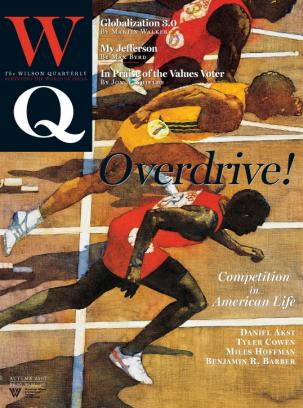Competition in American Life


Does modern war require better-educated leaders?
Promises countries make to gain entry into NATO or the EU are similar to Mary Poppins’s description of pie crust: Easily made, easily broken.
Voting records suggest that Republicans should hope for a rainy, snowy day on November 4, 2008.
The top 35 pop artists worldwide now earn most of their money from concerts, not recordings.
Something seems to be missing from modern literature: a little levity.
Contaminating food supplies are a tempting terrorist tactic. Just look at several anthrax outbreaks for a glimpse at the potential devastation.
An observer notes the Supreme Court's steady move to the right, accomplished, almost without notice or comment, by removing the court's left-leaning justices.
Off-site meetings for sales staff and other groups are a vast and largely untracked are of business expense. Are they worth it? You probably already know the answer.
Philanthropists would get much more bang for their buck if they looked at factors beyond their old school ties.
Today, a wide-ranging palate is the mark of a snooty foodie.
Many school districts boost a teacher's salary if he or she gets a master's degree, but there's no sign that their students' scores improve.
A new study shows that newspapers make a lot of mistakes, even in the limited instances when they publish a correction.
Book review sections almost universally are loss leaders, but without them, says one former editor, "the good society vanishes and barbarism triumphs."
For years Russians deported criminals to Siberia, then were forced to import women to deal with a surfeit of lawlessness among the new residents. It remains a less than desirable locale.
Even before the advent of compulsory birth control and sterilization measures, Chinese women bore far fewer children than their European counterparts. The leading cause: less sex.
American colonists were "married to royal political spectacles" and "championed their British king with emotional intensity" right up to the eve of the Revolution, says one historian.
A brief Islamic rebirth occurred in the republic Daghestan in 1991, but it may have been doomed from the start by seven decades of Soviet rule.
Anecdotal evidence says women talk more than men. Scientific evidence says that's just idle chatter.
Novelist H. G. Wells offered visions of the future in a number of books. His predictions weren't flawless, but they often hit close to the mark.
Nations have been squabbling for years over land claims in the Antarctic, but the area might better be served by declaring it a global commons.
The Andy Warhol Museum of Modern Art has always been viewed as an odd fit in Medzilzborce, Slovakia, not unlike Warhol himself.
A biographer of the late poet Cecil Day-Lewis turned to an unlikely source for insight into his indiscretions: the poet's widow.
A controversial new law in India, aimed at giving educational and employment preferences to "other backward classes," may only benefit the "creamy layer" of each caste.
Britain's newest prime minister, Gordon Brown, is a dedicated reader of serious books, but intellectuals have not always fared well at 10 Downing Street.
Refugees have been waiting three decades for civil strife in the Western Sahara to end.
David J. Garrow on the intelligence community
Sarah L. Courteau on the Bible's harlot queen
Jan Swafford on 20th-century classical music
Ken Chen on graphic novels
David Beers on irony after 9/11
Martin Walker on Geert Mak's European travels.
A history of children's play shows that it is anything but trivial.
Historian Nancy Isenberg argues that "everything we know about Aaron Burr is untrue."
The current plight of the American bison, which once numbered between 30 and 40 million in North America.
Hannah Holmes on how allergies shape our lives and landscapes.
The enduring beauty of Plato's Republic.
A behind-the-scenes look at a diplomat's life of service.
Reflections on the quinceañera, the Latina coming-of-age celebration.
Political scientists and liberal reformers want to remove highly charged moral issues to the sidelines, but what is the purpose of politics if not to address fundamental moral questions?
A new era of globlization dawned in December 2001, with the West passing the torch to China and India.
How do our own pasts connect with our larger cultural heritage? Here are 12 ways to respond to that question.
Thomas Jefferson was an enigma to everyone he met. A century and a half after his death, one writer strives to understand, if not the man himself, then at least the world as it knew him.
Competition seems to be hard-wired into humans, but is that such a bad thing? A look at where competing has gotten us.
Competition can produce excellence, but there are many other factors at play.
Americans are obsessed with competition, but they forget that cooperation and collective effort are the foundation of freedom.
In our globalized economy, competitors can suddenly appear out of nowhere—if we can see them at all. The new environment spells trouble for some people, opportunity for others.